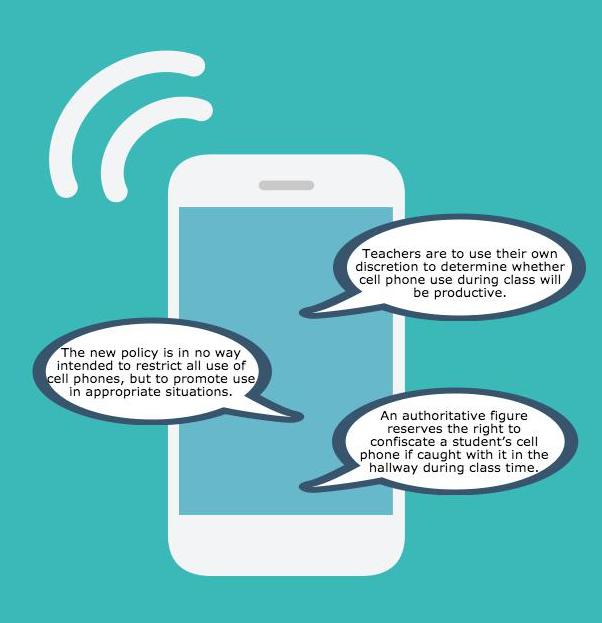School handbook limits cell use
New policies prohibit use of phones in halls, classroom
September 28, 2016
The administration adjusted the cell phone policy in hopes of limiting distractions and increasing productivity in the classroom for the coming school year.
According to principal Tom Mead, the focus was not to change the entire policy, but to make minor modifications and stress pre-established rules. The new policy encourages teachers to use their own discretion to determine whether cell phone use during class will be productive.
“What has been emphasized a little bit more is the primacy of the teachers’ expectations for the use of cell phones in the classroom,” Mead said. “The decision about class time itself, I want to leave squarely in the hands of the teacher. That’s really up to them how they permit and allow and encourage students to use their cell phones in pursuit of learning.”
The idea to improve upon the policy was initiated by instructional support teacher Marie Porteus, who believes cell phone addiction is hindering students’ education.
“One big thing that I don’t think kids realize is that all the time that they’re on the phone, they’re losing class time and they’re losing instruction,” Porteus said.
Mead expressed that the new policy is in no way intended to restrict all use of cell phones, but to promote use in appropriate situations where it will be beneficial to the learning environment.
“Cell phones have some very practical uses,” Mead said. “Increasingly so, in the classroom.”
However, there is a lack of support of restricted cell phone use among some of the student body.
“I think the stigma around cell phone use in school is mostly unjustified,” Hatton said. “Cell phones can be extremely useful in school if teachers are willing to let students be a little more independent, and this is certainly taking a step back from that.”
The adjusted policy doesn’t just oversee cell phone use while in the classroom, but also anywhere in the school. According to assistant principal Mel Laughton.
Some students doubt how consistently this rule will be enforced because it is difficult to constantly monitor the halls.
“I don’t think it will be effective, because how often will Mr. Laughton or a teacher see you in the hallway on your short walk to the bathroom?” senior Zoe Chang said.
According to Mead, administration is still trying to work out the details of enforcing this new rule.
“The only real question we have is how can we adequately stress [the restricted use of cellphones in the hallway] to students?” Mead said. “And we have to sort of figure that out because we don’t want to be slipshod in enforcement of expectations.”
Another addition to the policy that was introduced focuses on verbal privacy and protection.
“All members of the school community should be aware that under Massachusetts General Laws, it is a crime to secretly record a conversation, whether the conversation is in person or taking place by telephone or another medium,” the student handbook states.
According to The 189th General Court of The Commonwealth of Massachusetts, an offender of wiretapping can be fined up to ten thousand dollars and can face up to five years in prison.
Mead feels that this adjusted policy addresses all problems, including wiretapping, and he doesn’t predict that there will be any other changes in the near future.










